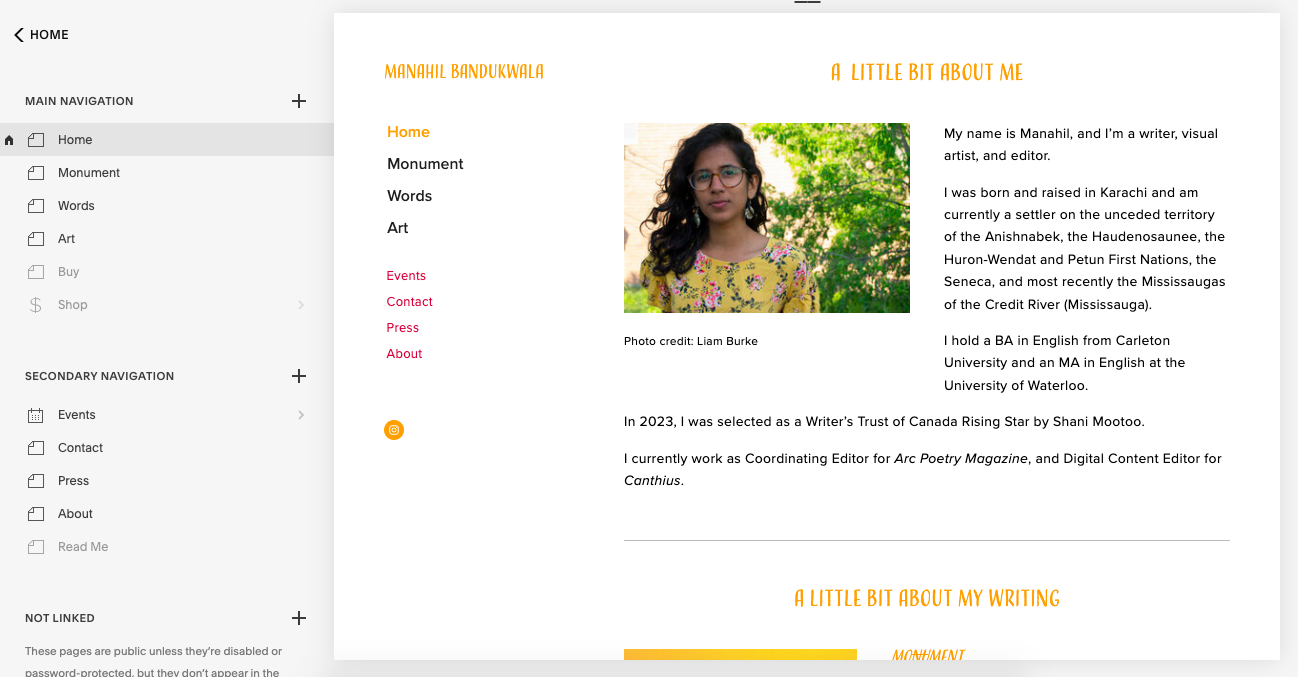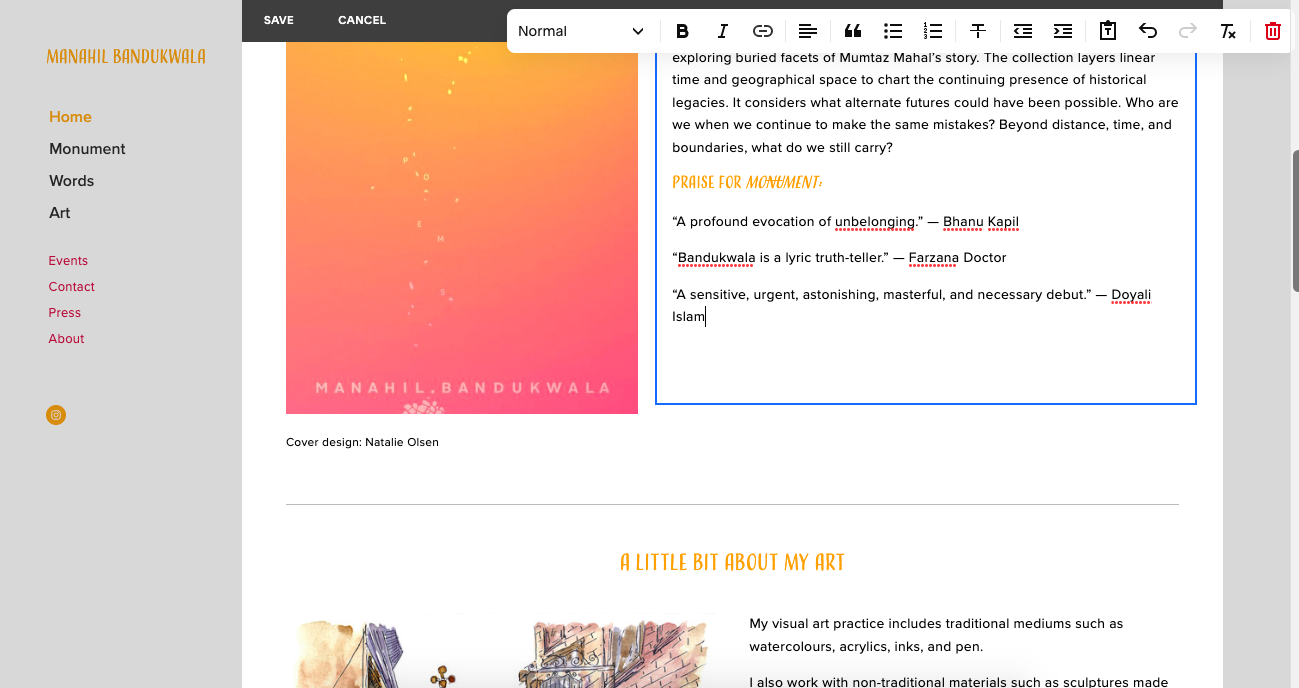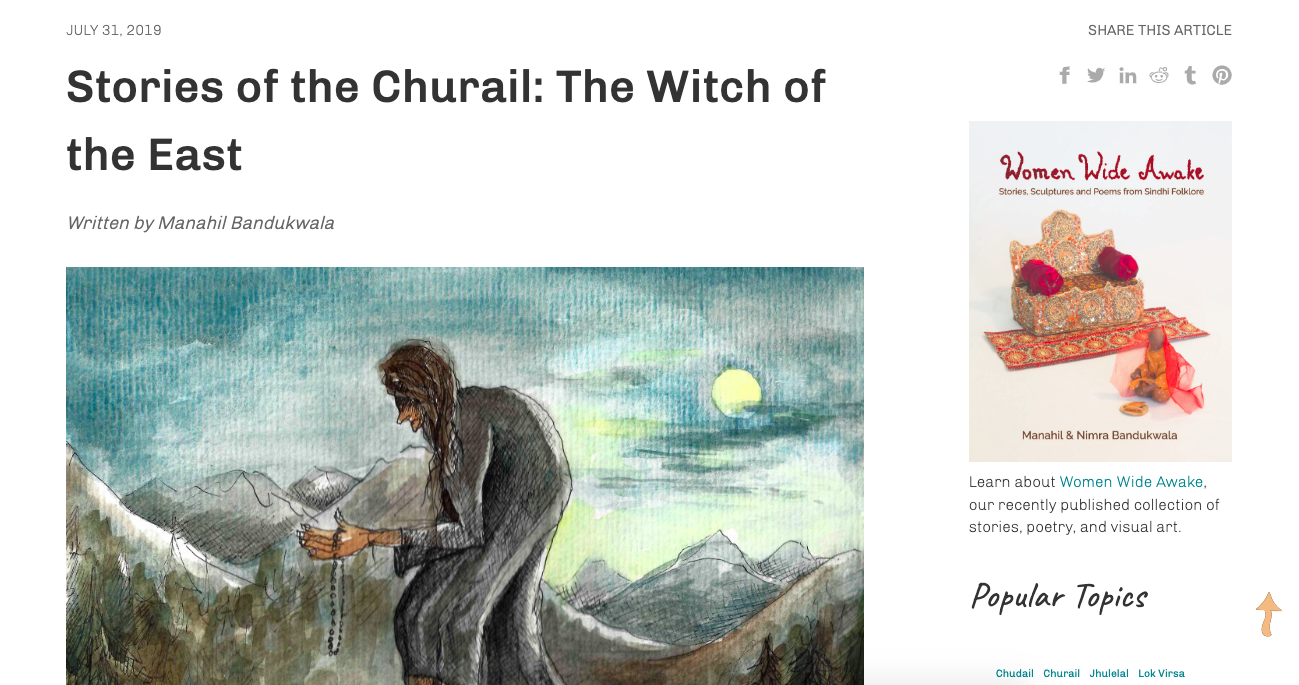Building an Author Website
By Manahil Bandukwala
You don’t need an author website, but it has helped me to have one. The more you start to publish, the more people will want to contact you for interviews, solicitations, and event invitations—and this increases when you have a book.
I prefer having formal communications over email as opposed to on social media. It’s a lot easier attaching documents on a computer than on Instagram or text, email doesn’t compress author photos the way Facebook does, and I’m usually not at my desk and in “work mode” when scrolling through social media. And in the age of Internet bots, it’s risky to have your email written out in the open. A contact form on a website connected to an email filters out a lot (though not all) spam emails.
I’ll leave this little pitch on why I like having an author website at that and, if you’re still reading, assume you’re interested in building one but have no idea where to start.
Gathering Content
An author website doesn’t need to be fancy. When someone looks at your website, they want to know who you are, where you’re located, and what you’ve published. The following things can all fit onto one page:
- An up-to-date bio with your location (for event invitations)
- Recent publications, especially books or chapbooks
- Involvements in the literary world (e.g. volunteering with a magazine)
- A way to contact you
Optional additions are an author photo or some kind of photograph for visual variation.
Build-It-Yourself
You have your content together, and now you need a place to put it.
- Squarespace: I use Squarespace for my author website because I wanted elements that were more involved than a simple 1-page website. Squarespace is very easy to use and produces a clean and professional look. It’s also very easy to buy the domain within Squarespace, but this also makes it more expensive than other options.
- WordPress: This is probably the most common website builder as it’s one of the most affordable. You can build websites on WordPress for free with a “domain.wordpress.com” URL, or you can purchase a domain and hosting plan.
- Wixsite: This is another option with a free “.wixsite.com” domain. While I personally haven’t used Wixsite, it is popular with magazine website in particular and offers a great visual aesthetic.
With all these website-builder options, actually creating the website is as simple as copy-pasting or typing content into blocks. You don’t need to interact with any code unless you want to! In the pictures below, I've shared a peek into what the back-end of my website looks like.
The free options in particular can be good starting points if you’re unsure about how much you’ll use an author website. You can have a way to contact you for opportunities available without committing financially.
Web Developers for Artists
You might have read my last blog post on the different things you can get grants for and noticed “website” on the list. This section is about where and how you might budget those funds if you are interested in creating a more intricate website. Poets are not always software experts. Sometimes they are, but I certainly am not. As a solo writer, you likely don’t need the in-depth consultation and development that magazines do when they hire companies for rebranding. The developer could be other poets with a background in web development, or someone with an interest in the arts.
I mentioned earlier that Squarespace is a more expensive option. I used Squarespace for a project website, Reth aur Reghistan, for a few years. This helped in building up the aesthetic and brand, but eventually got too expensive to justify continuing alongside mine and my sister’s personal websites. My sister connected with a web developer, Evan Buckiewicz, through a mutual friend, and it ended up working out great for us. Having someone who understood artist requirements specifically helped to tailor recommendations and assets, and to increase web accessibility. In the picture below, I've shared some of the features that a website developer was able to create that I wouldn't have otherwise been able to myself.
Your CanLit News
Subscribe to Open Book’s newsletter to get local book events, literary content, writing tips, and more in your inbox
Hiring a web developer is a bit of a “next step” for the artist-website-building process. This is where I recommend looking in your own writer networks for developers who can create a website that fulfills the purpose you want it to serve.
*
For myself, trying to keep a handle of all the administrative work required as a poet trying to create a semi-professional image can be overwhelming. A website is one of those things that has helped me a lot: having a centralized place of contact, a portfolio available, and a place to put links when I remember to update my website.
The views expressed in the Writer-in-Residence blogs are those held by the authors and do not necessarily reflect the views of Open Book.
Manahil Bandukwala is a multidisciplinary artist and writer. She is the author of Women Wide Awake (Mawenzi House, 2023) and Monument (Brick Books, 2022; shortlisted for the Gerald Lampert Memorial Award), and numerous chapbooks. In 2023, she was selected as a Writer's Trust Rising Star. See her work at manahilbandukwala.com.





